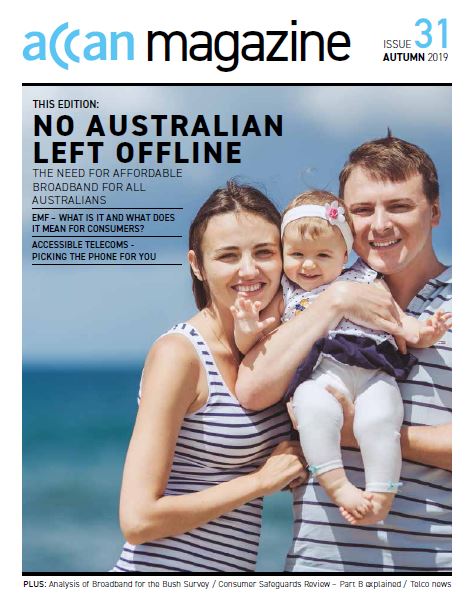Key Dates
Next Grant Round:
Applications for funding will open early 2025.
> Information about our Grants Program
Independent Grants Panel:
Results of the recent EOI will be notified Dec 2024.
> Information about our Panel
We can help: grants@accan.org.au
or phone 02 9288 4000
Subscribe to Grants Program mailings
The first thing that you should do if you are struggling to pay a bill is contact your service provider so you can discuss your options. Your provider can set up a payment plan for you, and while this is in place they will not report your debt to a Credit Reporting Agency.
Below are the contact details for some of the main service providers.
In a project funded by ACCAN, researchers at The University of Sydney analysed 61 top-rated mental health apps available to Australian consumers.
Mental health apps commonly collected consumer data, requested that consumers make in-app purchases, and made health claims. Although this is normal in the app world, we thought, “How would this stand up in the real world?”
![[Jane looking at the hand massage signs. Thinks, “hmmm…just what I need”]](/images/content/Article%20pictures/Panel1_v2.jpg)
Read more: Navigating mental health apps
Write comment (0 Comments)Download: ![]() ACCAN Magazine - Issue 31 Autumn 2019936.62 KB (Note: reading order not accessible)
ACCAN Magazine - Issue 31 Autumn 2019936.62 KB (Note: reading order not accessible)
Download accessible version: ![]() ACCAN Magazine Issue 31 Autumn 2019 - accessible version35.54 KB
ACCAN Magazine Issue 31 Autumn 2019 - accessible version35.54 KB

If you are unhappy with the service you are receiving from your telco, you can make a complaint.
Telcos have to follow rules about when small businesses can be disconnected, help they must provide if you can’t pay a bill, and more. If your small business spends less than $40,000 per year with one telco for your internet, landline and mobile phone services, you’re protected by these rules.
Read more: Making a Complaint - Small Business
Write comment (0 Comments)![]()

This tip sheet is available in:
![]() Arabic - Small Business Making a Complaint 247.73 KB
Arabic - Small Business Making a Complaint 247.73 KB
![]() Simplified Chinese - Small Business Making a Complaint249.15 KB
Simplified Chinese - Small Business Making a Complaint249.15 KB
![]() Spanish - Small Business Making a Complaint208.46 KB
Spanish - Small Business Making a Complaint208.46 KB
![]() Tagalog - Small Business Making a Complaint201.5 KB
Tagalog - Small Business Making a Complaint201.5 KB
![]() Vietnamese - Small Business Making a Complaint216.65 KB
Vietnamese - Small Business Making a Complaint216.65 KB
Read more: Small Business Making a Complaint - Information in other languages
ACCAN’s purpose is to work for “communications services that are trusted, inclusive and available for all.” Our Strategic Plan can be viewed at accan.org.au.
In 2021 ACCAN efforts will be focused on the following priority areas, informed by the impact of COVID-19 lockdowns on consumers’ use of communications services. At the same time, we will be responsive to emerging issues, and engage with government and industry consultations in areas of significance for telecommunications consumers
.
Our policy priorities are developed in close consultation with ACCAN members, and are informed by our knowledge and analysis of the communications market.
Gerard Goggin was an inaugural ACCAN Board member appointed in 2008. Since then Gerard has been a member of the ACCAN Independent Grants Panel which assesses applications for the ACCAN grants program. Gerard has continue to provide leadership on many communications consumer issues including universal service, accessibility issues and mobile telephony. Gerard is currently Wee Kim Wee Professor of Communication Studies at Nanyang Technology University in Singapore.
Now that the NBN has been declared built and fully operational, ACCAN has examined what needs to be changed in the telecommunications sector in order to protect consumer interests and maximise the benefits of broadband in the future. Underpinning this analysis is the shift in the way consumers use and rely on broadband services. Telecommunications is now widely regarded as an essential service, and so consumer protections and safeguards must be brought in line with this way of thinking.
ACCAN recently commissioned research asking the Australian public about their top concerns when it comes to their communications services.
We surveyed nearly 1000 (n=998) Australians on a range of topics. We asked people about the affordability and reliability of their communications services, their use and trust of public wi-fi, their TV viewing habits and what they do to keep themselves safe on social media, messaging apps and other digital platforms. The results show that in 2022, Australians expect a communications market that is trusted, inclusive, accessible and available for all.
![]()
Desktop computers - New South Wales
The Australian Communications Consumer Action Network’s (ACCAN) Board of Directors has unanimously endorsed the organisation’s support of the Voice to Parliament. A Voice to Parliament aligns with ACCAN’s organisational vision of Communications services that are trusted, inclusive, accessible, and available for all. A Voice to Parliament also aligns strongly with ACCAN’s Reconciliation Action Plan vision of a united Australia that acknowledges its past and values the unique culture and heritage of Aboriginal and Torres Strait Islander peoples.
The Board and staff of ACCAN support a successful Referendum that will enshrine a First Peoples Voice to Parliament in our Constitution. A Voice that can provide independent advice to Parliament and Government enables true self-determination by ensuring the diverse First Nations perspectives and aspirations are authentically embedded in decisions affecting their lives. A Voice will also provide new opportunities for community consultation to improve communications, particularly in regional and remote Australia.
Digital Literacy Foundation
Working towards universal digital inclusion is critical. In partnership with local Council and community organisations, this project will operate locally-based, face-to-face digital mentoring services for people in the Hawkesbury region. Workshops will build on a successful pilot program focused on increasing consumers’ access to online information, communications products, and services.
With many services digitised, older Hawkesbury residents are increasingly isolated, as the region’s rivers, bushland, unsealed roads, and devastation following fires (2019) and multiple floods (2022) has reduced access to physical services. The Hawkesbury region has a higher proportion of 50 to 84-year-olds than Greater Sydney (Census 2021), a group which, according to the Australian Digital Inclusion Index, are more likely to experience digital exclusion. The program aims to improve access to communication channels with community, family and government, including telehealth, and provide opportunities for increased social connectedness, and participation in online social and economic activities.
The opinion piece below was written by ACCAN CEO Carol Bennett for the Canberra Times. It was originally published on 13 December 2024.
Australians will go to the polls in the first half of next year with the cost-of-living crisis dominating the political agenda.
The skyrocketing costs of essentials have hit people hard. The housing crisis has sent rents spiralling, and supermarkets have been accused of price gouging on essential food items. The eye-watering cost of electricity and other utilities is also hitting hard.
Read more: Essential communications unaffordable for too many
Write comment (0 Comments)Australia’s peak communications consumer body, ACCAN, has expressed deep concern over new Telecommunications Industry Ombudsman (TIO) data, which reveals a sharp increase in consumer complaints and a troubling rise in unresolved cases late in late 2024.
Read more: Worrying new data the tip of telco complaints iceberg
ACCAN recently submitted to the Australian Communications and Media Authority (ACMA)'s consultation on new rules on telco complaints handling. The ACMA has amended the Telecommunications (Consumer Complaints Handling) Industry Standard 2018 after the Optus outage of November 2023 exposed issues with the complaints handling processes of telecommunications providers.
ACCANect 2022 Better Basics featured a range of presentations about key topics including access to reliable communications services, affordable communications, on-line safety and trust, and the essentiality of communications.
Thank you for joining us as we probed the progress and challenges of modernising communications basics for consumers, and to the future opportunities to work together and achieve ACCAN’s vision of communications services that are trusted, inclusive, accessible, and available for all.
All conference registrations have access to a video on demand (VOD) broadcast of the conference on the Delegate Connect Conference Platform.
Registration remains open for those who are not registered and wish to watch ACCANect 2022 Better Basics VOD.
 Contact Us
Contact Us
We encourage you to talk to us before applying for an ACCAN Grant. The Grants Team is available to help develop your project idea, ensure it's within scope, and with enough notice, we may be able to review a draft and help you make the most of your application.
The best way to reach us is via email - let us know a good time & number to phone you, or simply pop your questions & project ideas into the email. We will get back to you as soon as we can:
Email: grants @ accan.org.au
Phone: 02 9288 4000 (ACCAN reception) or via the National Relay Service
Subscribe
To keep up to date with all things grants related and to better understand ACCAN's work, subscribe to the mailing lists below:

![]() Fixed Voice Continuity Plan.pdf409.05 KB
Fixed Voice Continuity Plan.pdf409.05 KB
![]() Fixed Voice Continuity Plan.doc71.5 KB
Fixed Voice Continuity Plan.doc71.5 KB
Your business landline (fixed voice service) can be a critical business asset. If your fixed voice service failed, would your business continue to operate effectively?
Back-up (or failover) solutions for fixed voice services vary considerably depending on the size of your organisation and the purposes for which you use these services. Most small businesses are highly dependent on their fixed voice services so a continuity plan is important.
To minimise risk to your business from failure of your fixed voice services you should:
- Perform a 'risk assessment' for your business's use of telecommunications
- Obtain the most reliable fixed voice service that you can afford – to match the level of risk.
- Write an action plan for what you would do in the event of a disruption to this service (outage)
Read more: Preparing your organisation’s Fixed Voice Business Continuity Plan
Write comment (0 Comments)In order to sign up with some businesses, such as phone companies or internet providers, consumers are often required to be able to prove their identity. This can be problematic for people who do not have the typical standard identification documents such as a driver licence or a passport.
This tip sheet is intended to outline alternative methods that are accepted by telecommunications companies, specifically, Telstra, Optus and Vodafone.









